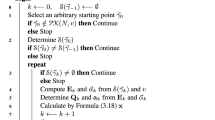Abstract
In this paper, we propose a new efficient value for transferable utility cooperative games with a coalition structure. It first assigns to every player his Aumann–Drèze value and then allocates the remainder of the worth of the grand coalition among players equally. As it is identical with the Aumann–Drèze value for coalitional games with a singleton coalition structure, we call it the egalitarian efficient extension of the Aumann–Drèze value. We provide three axiomatizations of it and compare it with other well-known efficient coalitional values, especially the Owen value and the two-step Shapley value.
Similar content being viewed by others
Notes
For simplicities of notation, we omit the braces for singletons, when no confusion occurs.
Following the name of Xu et al. [17], we may also call it as the additive efficient normalization of the AD-value.
A simple game is a TU game, whose range of characteristic function is \(\{0,1\}\). Since the family of simple games is not closed under addition, the additivity axiom is meaningless in this family.
References
Myerson, R.B.: Graphs and cooperation in games. Math. Oper. Res. 2(3), 225–229 (1977)
Aumann, R.J., Drèze, J.H.: Cooperative games with coalition structures. Int. J. Game Theory 3(4), 217–237 (1974)
Meessen, R.: Communication games. Master’s Thesis. Nijmegen University (1988)
Herings, J.J., van der Laan, G., Talman, D.: The average tree solution for cycle-free graph games. Games Econ. Behav. 62, 77–92 (2008)
Owen, G.: Values of games with a priori unions. In: Henn, R., Moeschlin, O. (eds.) Mathematical Economics and Game Theory, pp. 76–88. Springer, Berlin (1977)
Kamijo, Y.: A two-step Shapley value for cooperative games with coalition structures. Int. Game Theory Rev. 11(2), 207–214 (2009)
van den Brink, R., Khmelnitskaya, A., van der Laan, G.: An efficient and fair solution for communication graph games. Econ. Lett. 117(3), 786–789 (2012)
Hamiache, G.: A matrix approach to TU games with coalition and communication structures. Soc. Choice Welf. 38(1), 85–100 (2012)
Hu, X.F., Li, D.F., Xu, G.J.: Fair distribution of surplus and efficient extensions of the Myerson value. Econ. Lett. 165, 1–5 (2018)
Béal, S., Casajus, A., Huettner, F.: Efficient extensions of communication values. Ann. Oper. Res. 264(1–2), 41–56 (2018)
Slikker, M., van den Nouweland, A.: Social and Economic Networks in Cooperative Game Theory. Springer, New York (2001)
Driessen, T.S.H., Funaki, Y.: Coincidence of and collinearity between game theoretic solutions. Oper. Res. Spektrum 13(1), 15–30 (1991)
Gómez-Rúa, M., Vidal-Puga, J.: Balanced per capita contributions and level structure of cooperation. TOP 19(1), 167–176 (2011)
Calvo, E., Gutiérrez, E.: Solidarity in games with a coalition structure. Math. Soc. Sci. 60(3), 196–203 (2010)
Shapley, L.S.: A value for \(n\)-person games. In: Kuhn, H.W., Tucker, A.W. (eds.) Contributions to the Theory of Games, vol. II, pp. 307–317. Princeton University Press, Princeton (1953)
Béal, S., Casajus, A., Huettner, F.: Efficient extensions of the Myerson value. Soc. Choice Welf. 45(4), 819–827 (2015)
Xu, G.J., Driessen, T.S.H., Sun, H., Su, J.: Consistency for the additive efficient normalization of semivalues. Eur. J. Oper. Res. 224(3), 566–571 (2013)
Kamijo, Y.: The collective value: a new solution for games with coalition structures. TOP 21(3), 572–589 (2013)
Chun, Y., Park, B.: Population solidarity, population fair-ranking, and the egalitarian value. Int. J. Game Theory 41(2), 255–270 (2012)
Ferrières, S.: Nullified equal loss property and equal division values. Theory Decision 83(3), 385–406 (2017)
Kongo, T.: Effects of players’ nullification and equal (surplus) division values. Int. Game Theory Rev. 20(1), 1750,029 (2018)
Hart, S., Mas-Colell, A.: Potential, value, and consistency. Econometrica 57(3), 589–614 (1989)
Huettner, F.: A proportional value for cooperative games with a coalition structure. Theory Decision 78(2), 1–15 (2015)
Béal, S., Rémila, E., Solal, P.: Axiomatization and implementation of a class of solidarity values for TU-games. Theory Decision 83(1), 61–94 (2017)
Hu, X.F., Li, D.F.: A new axiomatization of the Shapley-solidarity value for games with a coalition structure. Oper. Res. Lett. 46(2), 163–167 (2018)
Wang, W.N., Sun, H., van den Brink, R., Xu, G.J.: The family of ideal values for cooperative games. J. Optim. Theory Appl. (2018). https://doi.org/10.1007/s10957-018-1259-8
Banzhaf, J.F.: Weighted voting doesn’t work: A mathematical analysis. Rutgers Law Review 19, 317–343 (1965)
Schmeidler, D.: The nucleolus of a characteristic function game. SIAM J. Appl. Math. 17(6), 1163–1170 (1969)
Levy, A., McLean, R.P.: Weighted coalition structure values. Games Econ. Behav. 1(3), 234–249 (1989)
Shapley, L.S.: Additive and non-additive set functions. Ph.D. Thesis, Princeton University, Princeton (1953)
Kalai, E., Samet, D.: On weighted Shapley values. Int. J. Game Theory 16(3), 205–222 (1987)
Hammer, P.L., Holzman, R.: Approximations of pseudo-Boolean functions; applications to game theory. Math. Methods Oper. Res. 36(1), 3–21 (1992)
Myerson, R.B.: Conference structures and fair allocation rules. Int. J. Game Theory 9(3), 169–182 (1980)
Calvo, E., Lasaga, J.J., Winter, E.: The principle of balanced contributions and hierarchies of cooperation. Math. Soc. Sci. 31(3), 171–182 (1996)
Casajus, A.: Outside options, component efficiency, and stability. Games Econ. Behav. 65(1), 49–61 (2009)
Acknowledgements
Great appreciation is given to Hans Peters and three anonymous referees for helpful comments. This work was supported by the Key Program of National Natural Science Foundation of China (71231003), the National Natural Science Foundation of China (71671140), and the Scientific Research Allowance of Guangzhou University (69-18ZX10337).
Author information
Authors and Affiliations
Corresponding author
Additional information
Communicated by Dusan Stipanovic.
Rights and permissions
About this article
Cite this article
Hu, XF., Xu, GJ. & Li, DF. The Egalitarian Efficient Extension of the Aumann–Drèze Value. J Optim Theory Appl 181, 1033–1052 (2019). https://doi.org/10.1007/s10957-018-1440-0
Received:
Accepted:
Published:
Issue Date:
DOI: https://doi.org/10.1007/s10957-018-1440-0
Keywords
- Transferable utility cooperative game
- Coalition structure
- Aumann–Drèze value
- Owen value
- Two-step Shapley value




